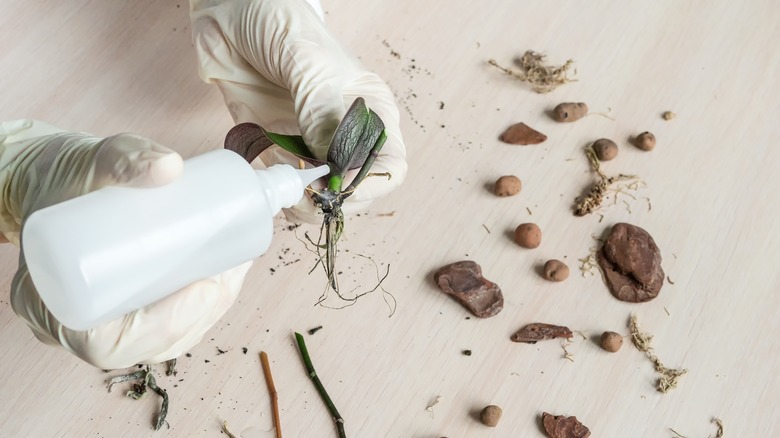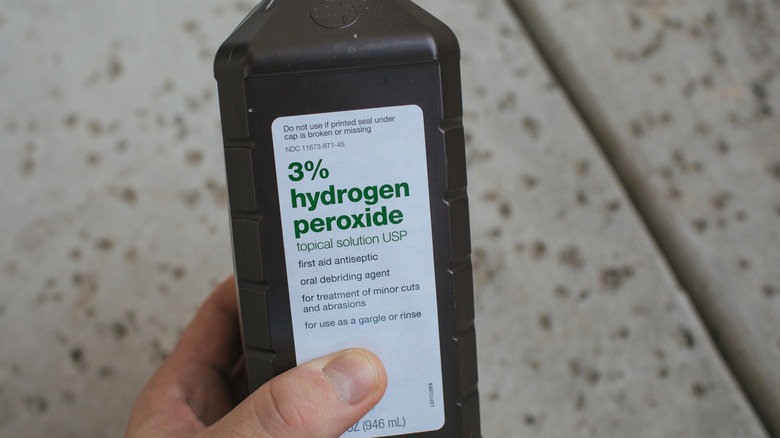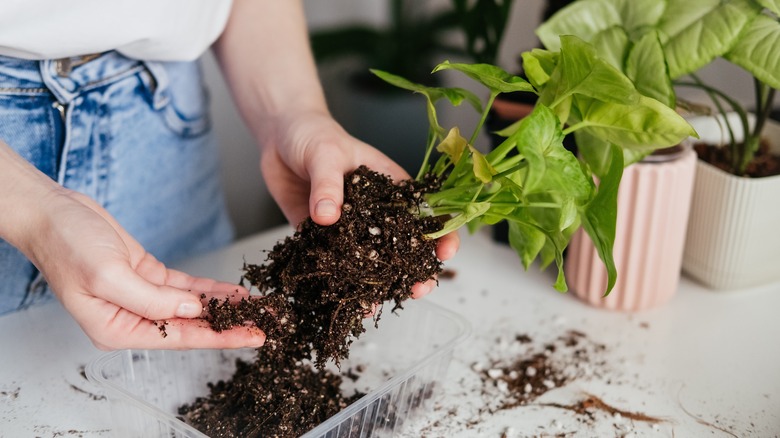Using Hydrogen Peroxide As A Last Resort To Combat Root Rot: Does It Work?
Picture this: You notice your plant's leaves are looking yellow or shriveled despite regular watering. After a little investigation, you realize you made the rookie mistake — overwatering. Root rot is a common issue many houseplant and garden lovers face at least once in their lives. Knowing how to deal with root rot can be the difference between a revived plant and one that needs to be tossed. But what is the best course of action? Some say you may have the perfect treatment for this soil fungus sitting in your cabinets right now: hydrogen peroxide. A study by the Plant Pathology Department at Aswan University showed that 2% hydrogen peroxide completely inhibited the growth of R. solani, Pythium sp., and F. solani fungi on thyme plants, indicating that it may be helpful in controlling root rot. Keep in mind this study only focused on thyme, so while it is promising, it doesn't necessarily ensure it'll work well for all plants.
Most of the evidence showing hydrogen peroxide's efficacy in treating root rot is anecdotal. Although it may not always be successful, if your plant is already dying, it's worth a shot to try and bring it back to life. With that said, you don't want to grab a bottle and dump it straight into the soil. While hydrogen peroxide may be beneficial, too much can damage your plants. Additionally, there are some other steps to take before you treat your houseplants for root rot with this product. Let's get into it.
Why hydrogen peroxide may work
If you've been a houseplant hobbyist for a while, or have a lush outdoor garden, you've probably heard many tips and tricks about hydrogen peroxide. This common household product can get rid of spider mites and other pests when diluted and sprayed onto plants. It's also a common solution used to clean and disinfect gardening tools to help prevent contamination from sick plants. Hydrogen peroxide is a chemical compound that may look like water, but has antiseptic and antifungal properties. Root rot is a plant disease in which a pathogen destroys a plant's root system. There are several different types of root rot and pathogens that lead to the deterioration of the system.
Considering the above, hydrogen peroxide is thought to kill root rot-causing fungi, allowing the plant to fight off the disease. Additionally, hydrogen peroxide may help soil aeration, which is key for a healthy root system. According to Florida Colors Nursery, when the soil soaks up the hydrogen peroxide, the chemical breaks down and releases oxygen. This extra oxygen improves overall plant health because the roots rely on this air to receive nutrients. So, not only can you use hydrogen peroxide to treat root rot, it may be a helpful tool in preventing it.
How to treat root rot with hydrogen peroxide
If you suspect one of your plants has root rot, the best way to know for sure is to check the roots themselves. Take your plant out of its pot and remove as much dirt as you can. Then, rinse off any remaining soil, giving you a good view of the roots. Give them a gentle squeeze. If they're dark in color, feel squishy, or immediately break off, it's likely your plant is infected. Use sanitized gardening shears to carefully remove any unhealthy roots, as well as all dying leaves and stems. Once you're finished, you should be left with white roots and healthy foliage.
Mix a diluted solution using 1 tablespoon of hydrogen peroxide for each cup of water and add it to a spray bottle. Spritz all of the roots of your plant before repotting. Clean the pot thoroughly with soapy water. Rinse the container off and add a fresh layer of dirt to replant. You may also use this solution instead of water the next time you hydrate your plants. Moving forward, make sure not to overwater your plants. Generally speaking, you should drench your soil, ensuring all of the roots get a good drink, and wait for the soil to dry out between waterings. It's also best to choose containers with drainage holes to prevent waterlogging. That said, each plant has its own unique needs, with some requiring more watering sessions than others, so be sure to educate yourself on your specific plant.


